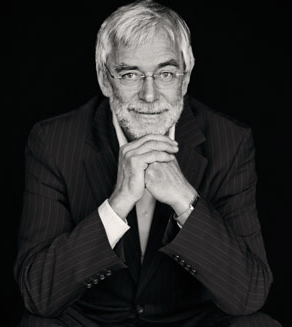
Von Martin Frischknecht
Als Professor leitet er eine Fachstelle für neurobiologische Präventionsforschung und ist Autor von Studien und Fachbüchern zur Hirnentwicklung. Zugleich und hauptsächlich ist Gerald Hüther ein warmherziger, nahbarer Mensch, einer, der Dinge beim Namen nennt und andere inspiriert.
SPUREN: Herr Hüther, Sie haben sich ausgiebig mit den Bedingungen beschäftigt, unter denen es dem Menschen, namentlich in der Kindheit, gelingt, sein Potenzial zu entfalten. Haben Sie persönlich in Ihrem Leben einfach ein gutes Los gezogen, dass Ihnen das in der Kindheit weitgehend möglich war?
Gerald Hüther: Sicherlich gehört da auch Glück dazu. Ich bin in Thüringen in der ehemaligen DDR auf einem Hof mit Wassermühle grossgeworden. Wir waren an die zehn Cousins und Cousinen und lebten in altersgemischten Spielgruppen, die sich die Welt mehr oder weniger selber erschlossen, ähnlich wie Astrid Lindgrens Bullerbü. Da lernt man natürlich unglaublich viel, nicht so sehr von den Erwachsenen oder im „Frühförderunterricht“, sondern von den älteren Kindern, die sich schon etwas besser auskennen. Man ist in diesen Gruppen sehr stark verankert, weiss, dass man gebraucht wird “ jeder auf seine Weise. Der Dreijährige hat eine genauso wichtige Funktion wie der Fünfzehnjährige, weil jeder auf seine Weise etwas zu dem Spass und zu der Freude beitragen kann, die man zusammen hat. Manch eine Aufgabe lässt sich nur gemeinsam bewältigen. Das sind schon sehr günstige Voraussetzungen, wie sie viele junge Menschen in dieser Form heute kaum mehr finden.

Jesus Didn’t Speak English — He Spoke Aramaic.
The words we know today as the “Lord’s Prayer” have traveled a long journey — through Greek, Latin, and countless English translations. But originally, Jesus spoke Aramaic, a language rich in poetic nuance, symbolic layers, and deep spiritual resonance.
To offer a more holistic perspective, I’ve gathered a selection of different versions of this sacred prayer — including translations that return to its original Aramaic roots.
Take a moment. Breathe. Let yourself feel the difference — and the depth — of these timeless words.
Enjoy the resonance. Rediscover the meaning.
THE ARAMAIC PRAYER OF JESUS
translated from Aramaic by Saadi Neil Douglas-Klotz of the Sufi Order of the West
The „Aramaic Prayer of Jesus“ offers a fresh and deeply spiritual perspective on the well-known „Lord’s Prayer,“ restoring its original poetic and mystical depth. Unlike traditional English translations based on Greek or Latin texts, this version returns to the language Jesus actually spoke – Aramaic – a Semitic language rich in layered meaning, sacred metaphor, and inner resonance.
In this rendering, each line becomes a meditation, inviting the reader into a more embodied and heart-centered experience of the prayer. Rather than conveying rigid dogma, it opens pathways to intimacy with the Divine through breath, sound, and silence – resonating strongly with both Sufi mysticism and universal spirituality.
Saadi Neil Douglas-Klotz, a renowned scholar and spiritual teacher of the Sufi Order of the West, brings to the translation a profound sensitivity to both linguistic nuance and the contemplative traditions that unite East and West. His work invites seekers of all paths to rediscover the voice of Jesus as a mystic and teacher of unity, compassion, and inner awakening.
THE ARAMAIC PRAYER OF JESUS
O, Birther of the Cosmos, focus your light within us – make it useful
Create your reign of unity now
Your one desire then acts with ours,
As in all light,
So in all forms,
Grant us what we need each day in bread and insight:
Loose the cords of mistakes binding us,
As we release the strands we hold of other’s guilt.
Don’t let surface things delude us,
But free us from what holds us back.
From you is born all ruling will,
The power and the life to do,
The song that beautifies all,
From age to age it renews.
I affirm this with my whole being.
NASA is so sure the world won’t come to an end on Dec. 21, 2012, they have already released this news item for the day after.
Dec. 22, 2012: If you’re reading this story, it means one thing: The World Didn’t End Yesterday.
According to media reports of an ancient Maya prophecy, the world was supposed to be destroyed on Dec. 21, 2012.
Apparently not.
„The whole thing was a misconception from the very beginning,“ says Dr. John Carlson, director of the Center for Archaeoastronomy. „The Maya calendar did not end on Dec. 21, 2012, and there were no Maya prophecies foretelling the end of the world on that date.“
For more see here…
Come rain or shine, 88-year-old Bermudian Johnny Barnes devotes six hours every day to an endearing traffic ritual that has made him one of the island’s most cherished citizens.
See for more at the www.globalonenessproject.org
 In the last century, a tourist from the States visited the famous Polish rabbi, Hofetz Chaim. He was astonished to see that the rabbi‘s home was only a simple room filled with books. The only furni-ture was a table and a bench.“Rabbi, where is your furniture?“ asked the tourist. “Where is yours?“ said Hofetz. “Mine? But I‘m passing through. I‘m only a visitor here.“
In the last century, a tourist from the States visited the famous Polish rabbi, Hofetz Chaim. He was astonished to see that the rabbi‘s home was only a simple room filled with books. The only furni-ture was a table and a bench.“Rabbi, where is your furniture?“ asked the tourist. “Where is yours?“ said Hofetz. “Mine? But I‘m passing through. I‘m only a visitor here.“
„So am I.“ Anthony de Mello


